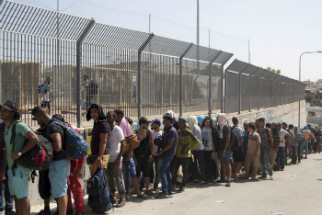
The Church addresses global migration crisis
FREE Catholic Classes
An unprecedented 66 million people worldwide have been forced from their homes by conflict and violence, according to a report released Wednesday the Center for Strategic and International Studies.

Highlights
Catholic Online (https://www.catholic.org)
5/31/2018 (7 years ago)
Published in Politics & Policy
Keywords: Internally Displaced Persons, Asylum seekers
Washington D.C. (CNA/EWTN News) - The May 30 report, "Confronting the Global Migration Crisis", found that developing countries host the majority of forced migrants, meaning that poor communities which lack resources are supporting a disproportionate amount of refugees and migrants.
Catholic Relief Services staff have seen this occur on the ground in Africa, where the CSIS report documented that "almost 94 percent of all forced migrants in Africa stay in Africa."
"The refugee crisis has put a tremendous strain on host communities, many of which struggle to meet their own population's needs. Around 85 percent of refugees are in low or middle income countries. It's really important to make sure that when we provide support to the displaced that we don't forget about the needs of the people hosting them," Emily Wei, the deputy director for policy development at CRS, told CNA.
Turkey, Pakistan, Lebanon, Iran, and Uganda are the countries that hosted the greatest share of refugees in 2016. According to United Nations refugee agency, Uganda hosted more than 1 million South Sudanese refugees in 2017.
"In Uganda," continued Wei, "Catholic Relief Services is supporting nearly 100,000 people within both the host and refugee communities with shelter, clean water and livelihoods. Refugees and host community members work alongside each other, build houses together."
CRS has found that building relationships between the host and refugee communities in developing countries helps reduce potential tensions from strained resources.
"As the number of refugees and displaced continues to grow, we need to continue to find ways to help host communities and refugees work together to build a more sustainable future for everyone," said Wei.
A "forced migrant" falls into one of three categories: refugee, internally displaced person, or asylum seeker. The majority of 66 million people forced from their homes in 2016 were people displaced within their own countries by violent conflict, disaster, or human rights violations. These IDPs made up 40.3 million of forced migrants globally.
The number of refugees, 22.5 million globally in 2016, was the highest it has been since World War II. There were also an additional 3 million people seeking asylum in another country, according the CSIS report authored by Erol K. Yayboke and Aaron N. Milner.
Armed conflicts, political persecution, natural and human-induced disasters, and food insecurity were among the most common drivers of forced migration cited in the report.
Forced migrants are intrinsically vulnerable communities, however the report highlighted that female migrants face "sexual assault and exploitation, rape, child marriage, and all types of violence not only as a cause of their displacement but also during their journey, while simultaneously and independently caring for children."
When confronting this global crisis, the U.S. Catholic Bishops Conference Migration and Refugee services representative told CNA that it is important to look toward long term solutions and address the root causes of displacement.
"In this era of unprecedented forced migration, we need to think about durable solutions to ensure people are able to live safely and decently and with their families. This includes looking for peace-building solutions to ensure people who do not want to migrate can also have that chance," said Ashley Feasley, the director of policy for the U.S. Bishops' Migration and Refugee Services.
"The global Catholic community has long been involved in helping advance this goal - whether it be from resettlement to humanitarian aid and community integration," Feasley added.
She encouraged Catholics to look to Pope Francis, who encourages the welcoming of those fleeing persecution and displacement. "Catholics here in the US can follow the Holy Father's example on a local level, through supporting newly arriving immigrants and refugees in the community, and looking to foster encounter with them at their parishes," encouraged Feasley.
The U.S. Catholic Bishops' Migration and Refugee Services have put together a toolkit to help parishes celebrate World Refugee Day on June 20. It includes prayers for refugees and an list of specific ways Catholics can engage their local communities to aid refugees.
---
'Help Give every Student and Teacher FREE resources for a world-class Moral Catholic Education'
Copyright 2021 - Distributed by Catholic Online
Join the Movement
When you sign up below, you don't just join an email list - you're joining an entire movement for Free world class Catholic education.
A Lenten Message from Sister Catherine - Please Watch
- Easter / Lent
- 5 Lenten Prayers
- Ash Wednesday
- 7 Morning Prayers
- Mysteries of the Rosary
- Litany of the Bl. Virgin Mary
- Popular Saints
- Popular Prayers
- Female Saints
- Saint Feast Days by Month
- Stations of the Cross
- St. Francis of Assisi
- St. Michael the Archangel
- The Apostles' Creed
- Unfailing Prayer to St. Anthony
- Pray the Rosary
![]()
Copyright 2026 Catholic Online. All materials contained on this site, whether written, audible or visual are the exclusive property of Catholic Online and are protected under U.S. and International copyright laws, © Copyright 2026 Catholic Online. Any unauthorized use, without prior written consent of Catholic Online is strictly forbidden and prohibited.
Catholic Online is a Project of Your Catholic Voice Foundation, a Not-for-Profit Corporation. Your Catholic Voice Foundation has been granted a recognition of tax exemption under Section 501(c)(3) of the Internal Revenue Code. Federal Tax Identification Number: 81-0596847. Your gift is tax-deductible as allowed by law.








